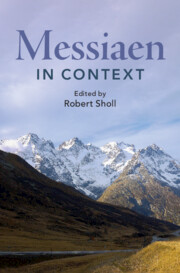Book contents
- Messiaen in Context
- Composers in Context
- Messiaen in Context
- Copyright page
- Contents
- Figures
- Tables
- Musical Examples
- Contributors
- Abbreviations
- Part I Mondial Messiaen
- Chapter 1 Introduction
- Chapter 2 Messiaen’s Family
- Chapter 3 Yvonne Loriod
- Chapter 4 Messiaen and the Paris Conservatoire
- Chapter 5 Messiaen and Classical India and Greece
- Chapter 6 Messiaen and the USA
- Chapter 7 Messiaen and the Idea of Japan
- Chapter 8 Messiaen and China
- Chapter 9 Messiaen and Australia
- Part II Messiaen and Theology
- Part III Composers, Performers, and Critics
- Part IV Concepts and Legacy
- Select Bibliography
- Index
Chapter 5 - Messiaen and Classical India and Greece
from Part I - Mondial Messiaen
Published online by Cambridge University Press: 09 November 2023
- Messiaen in Context
- Composers in Context
- Messiaen in Context
- Copyright page
- Contents
- Figures
- Tables
- Musical Examples
- Contributors
- Abbreviations
- Part I Mondial Messiaen
- Chapter 1 Introduction
- Chapter 2 Messiaen’s Family
- Chapter 3 Yvonne Loriod
- Chapter 4 Messiaen and the Paris Conservatoire
- Chapter 5 Messiaen and Classical India and Greece
- Chapter 6 Messiaen and the USA
- Chapter 7 Messiaen and the Idea of Japan
- Chapter 8 Messiaen and China
- Chapter 9 Messiaen and Australia
- Part II Messiaen and Theology
- Part III Composers, Performers, and Critics
- Part IV Concepts and Legacy
- Select Bibliography
- Index
Summary
Messiaen’s debt to Indian and Greek music – in particular, to the 120 desitalas systematised by the thirteenth-century theorist Sar?gadeva – is well known. The composer’s encounter with the ‘rythmes hindous’ in an encyclopedia entry led him to breakthroughs in his compositional technique from the 1930s, as he derived innovative rhythmical principles and, later, mystical associations from the rhythms over the course of his career. This chapter proposes new and broader perspectives on this subject, situating Messiaen within a history of early-twentieth-century French musical and musicological engagement with Indian music theory – a lineage including composers like Tournemire, Roussel, and Emmanuel – and complicating existing accounts of Messiaen’s rhythmic experimentation by using newly available sketch materials.
- Type
- Chapter
- Information
- Messiaen in Context , pp. 37 - 45Publisher: Cambridge University PressPrint publication year: 2023

